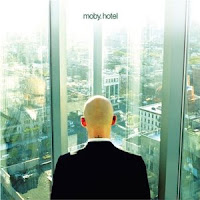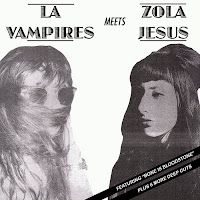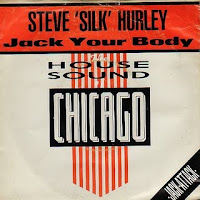A lot of the music I've listened to the past week has been what I'd describe as 'situational', or 'mood specific'. I think we all tend to put on music to either suit a particular mood or to provide a backdrop to a certain activity, either consciously or subconsciously. Some decidedly conscious examples from this week follow.
On a flight to Edinburgh this week I needed to work on some work for a course I'm doing. Two middle-aged women decided to sit next to me and proceeded to talk and talk and talk as soon as soon as they sat down. I swear they were the only people on the whole flight talking. To block them out but still focus on my studies, I put on Hotel : Ambient by Moby, a collection of absorbing, laid-back tracks released as a bonus disc with his 2005 album that wouldn't have gone amiss as the soundtrack to Sofia Coppola's detached Lost In Translation (maybe I say that because that film was mainly set in a Tokyo hotel); instead she chose My Bloody Valentine's Kevin Shields. So it goes. The Moby album seemed to work: I could still hear the women droning on, but the music adequately sharpened my attention for the course materials.

The next night, turning down the temptation of a second night out with colleagues in Edinburgh, I returned to my hotel room to check on the day's emails. For this I chose LCD Soundsystem's This Is Happening, just because it had a fairly upbeat edge. I often find that if I'm trying to focus on getting a lot of stuff done quickly, listening to something quite fast-paced will generally help. The warped, elastic not-quite-acid-house motorik electro of 'One Touch' and the inimitable ersatz post-punk of 'Drunk Girls' seemed to provide the perfect soundtrack to sorting through the day's messages.

Returning to my studies that night, I first stuck on a collaboration EP between LA Vampires and Zola Jesus. LA Vampires evoke the casual nihilism and violence of the shady blood-suckers depicted in the second half of Bret Easton Ellis's The Informers. The work of Amanda Brown, LA Vampires have no website, eschew Facebook and Twitter and are about as mysterious as the vampires of the book that inspired this music, the sound being a heavily processed dub reggae, augmented here with the mostly wordless vocals of Zola Jesus (Nika Rosa Danilova). I've had this for a while and it suits a particular mood; I'm not sure that was studying, but I used to revise to King Tubby at Uni, so it was a (dub) echo of those days that prompted the choice.

After that, I stuck on Luke Slater's 7th Plain's My Wise Yellow Rug, a collection of extraterrestrial electronica released in 1994. I was attracted to this album when I read a review in the NME that described one of the tracks as being like Vangelis's theme for Blade Runner as covered by Vince Clarke, and being a long-standing fan of the latter, I was down the shops like a shot to get a copy. It came in a cardboard packet with a Magic Eye picture on the front. I'm colour blind and so struggle to make out what it is, but the main thing that night was that it proved conducive to studying. I wound down to sleep that night with Nico's Chelsea Girls, until her Marmite voice began to grate.

Vinyl Corner

Steve 'Silk' Hurley 'Jack Your Body' (7", London Records, 1986)
The thing I most remember about this song was the video, and not in a good way. I seem to recall that there was a tendency to match early dance music tracks with goofy videos almost entirely derived from clips from old black and white movies, cartoons etc - fragments clipped from other sources recontextualised alongside other bits of filmic detritus. A bit like sampling really, just with film. Whilst quite clever and arty and a load of other highbrow adjectives, to me it was just cheesy.
I'm not sure I necessarily liked the song at the time either. That said, I was ten in '86 when this got its UK release, and dance music interested me pretty much from the time such radio-friendly transmissions began to appear in the charts. Picking this up many years later I found the 'Jack-jack-jack your body' sample torridly dated but the Chicago house groove quite appealing. There is something enduringly interesting about the simplicity of early dance music – something which got forgotten about somewhere along the lines with a switch to density and high gloss production; a style which the Berlin school distilled back to its minimal pulse almost in parallel. There isn't a lot to this song at all – a simple bassline, a simple melody, an 808 rhythm and the odd sampled vocal refrain.
It's still a good track even if for nostalgia purposes alone, though I'd have preferred it if the dub on the B-side had dispensed with the vocal riffs completely. But let us not forget that as it was released in 1985 it's just about one of the oldest house records there is. A reminder once again that dance music didn't start in the fabled acid-soaked summer of love, 1988.
On a flight to Edinburgh this week I needed to work on some work for a course I'm doing. Two middle-aged women decided to sit next to me and proceeded to talk and talk and talk as soon as soon as they sat down. I swear they were the only people on the whole flight talking. To block them out but still focus on my studies, I put on Hotel : Ambient by Moby, a collection of absorbing, laid-back tracks released as a bonus disc with his 2005 album that wouldn't have gone amiss as the soundtrack to Sofia Coppola's detached Lost In Translation (maybe I say that because that film was mainly set in a Tokyo hotel); instead she chose My Bloody Valentine's Kevin Shields. So it goes. The Moby album seemed to work: I could still hear the women droning on, but the music adequately sharpened my attention for the course materials.

The next night, turning down the temptation of a second night out with colleagues in Edinburgh, I returned to my hotel room to check on the day's emails. For this I chose LCD Soundsystem's This Is Happening, just because it had a fairly upbeat edge. I often find that if I'm trying to focus on getting a lot of stuff done quickly, listening to something quite fast-paced will generally help. The warped, elastic not-quite-acid-house motorik electro of 'One Touch' and the inimitable ersatz post-punk of 'Drunk Girls' seemed to provide the perfect soundtrack to sorting through the day's messages.

Returning to my studies that night, I first stuck on a collaboration EP between LA Vampires and Zola Jesus. LA Vampires evoke the casual nihilism and violence of the shady blood-suckers depicted in the second half of Bret Easton Ellis's The Informers. The work of Amanda Brown, LA Vampires have no website, eschew Facebook and Twitter and are about as mysterious as the vampires of the book that inspired this music, the sound being a heavily processed dub reggae, augmented here with the mostly wordless vocals of Zola Jesus (Nika Rosa Danilova). I've had this for a while and it suits a particular mood; I'm not sure that was studying, but I used to revise to King Tubby at Uni, so it was a (dub) echo of those days that prompted the choice.

After that, I stuck on Luke Slater's 7th Plain's My Wise Yellow Rug, a collection of extraterrestrial electronica released in 1994. I was attracted to this album when I read a review in the NME that described one of the tracks as being like Vangelis's theme for Blade Runner as covered by Vince Clarke, and being a long-standing fan of the latter, I was down the shops like a shot to get a copy. It came in a cardboard packet with a Magic Eye picture on the front. I'm colour blind and so struggle to make out what it is, but the main thing that night was that it proved conducive to studying. I wound down to sleep that night with Nico's Chelsea Girls, until her Marmite voice began to grate.

Vinyl Corner

Steve 'Silk' Hurley 'Jack Your Body' (7", London Records, 1986)
The thing I most remember about this song was the video, and not in a good way. I seem to recall that there was a tendency to match early dance music tracks with goofy videos almost entirely derived from clips from old black and white movies, cartoons etc - fragments clipped from other sources recontextualised alongside other bits of filmic detritus. A bit like sampling really, just with film. Whilst quite clever and arty and a load of other highbrow adjectives, to me it was just cheesy.
I'm not sure I necessarily liked the song at the time either. That said, I was ten in '86 when this got its UK release, and dance music interested me pretty much from the time such radio-friendly transmissions began to appear in the charts. Picking this up many years later I found the 'Jack-jack-jack your body' sample torridly dated but the Chicago house groove quite appealing. There is something enduringly interesting about the simplicity of early dance music – something which got forgotten about somewhere along the lines with a switch to density and high gloss production; a style which the Berlin school distilled back to its minimal pulse almost in parallel. There isn't a lot to this song at all – a simple bassline, a simple melody, an 808 rhythm and the odd sampled vocal refrain.
It's still a good track even if for nostalgia purposes alone, though I'd have preferred it if the dub on the B-side had dispensed with the vocal riffs completely. But let us not forget that as it was released in 1985 it's just about one of the oldest house records there is. A reminder once again that dance music didn't start in the fabled acid-soaked summer of love, 1988.








